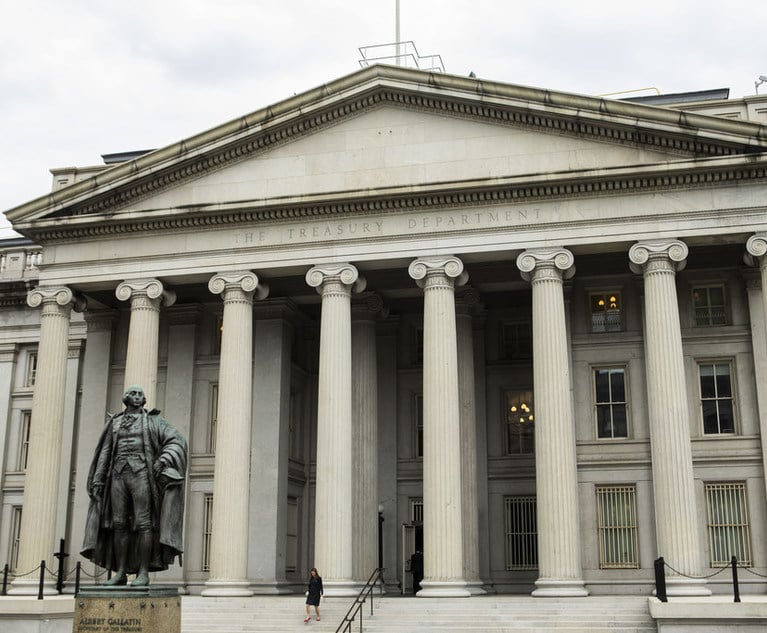Regulatory: DOJ & HHS tout $4.1 billion in recoveries in 2011
On Feb. 14, 2011, the Department of Justice (DOJ) and the Department of Health and Human Services (HHS) sent Valentines Day greetings by announcing that in fiscal year 2011, the agencies recovered approximately $4.1 billion from joint enforcement efforts.
March 07, 2012 at 05:10 AM
3 minute read
The original version of this story was published on Law.com
On Feb. 14, 2011, the Department of Justice (DOJ) and the Department of Health and Human Services (HHS) sent Valentine's Day greetings by announcing that in fiscal year 2011, the agencies recovered approximately $4.1 billion from joint enforcement efforts. The statistics demonstrate the agencies' continued commitment to combating health care fraud and abuse:
- 1,110 new criminal investigations (targeting 2,561 potential defendants) opened
- 1,873 health care fraud prosecutions (targeting 3,118 potential defendants) pending
- 489 new criminal cases (against 1,430 named defendants) filed
- 743 defendants convicted of health care-related crimes
Many criminal matters also have a parallel civil counterpart, and the FY 2011 report also noted that in the same timeframe, DOJ opened 977 new civil health care fraud investigations, adding to its 1,069 pending matters. These include qui tam matters and False Claims Act complaints lodged by whistleblowers. HHS also announced that in FY 2011 alone, it exercised its mandatory exclusion authority to exclude 2,662 individuals and entities from federal health care benefit programs.
Also in FY 2011, the federal government increased its commitment to its Health Care Fraud Prevention & Enforcement Action Team (HEAT), by expanding resources to two new cities: Chicago and Dallas. The HEAT teams coordinate efforts between state and local law enforcement agencies, employing sophisticated data mining technology to identify high-billing levels in certain geographic locations in an effort to reduce fraud and abuse. The FY 2011 DOJ/HHS report announced that HEAT efforts have resulted in 323 defendants being charged in that period, resulting in 175 defendants being sentenced to an average prison term of 47 months. From 2009-2011, the return on investment for efforts to eradicate fraud and abuse was $7.2 dollars for every dollar spent.
The FY 2011 numbers demonstrate a continued increase in health care fraud prosecutions and civil lawsuits. This likely results from an increasingly coordinated effort by law enforcement to work together and share resources. For years, those involved in the health care industry were far more knowledgeable about the regulatory framework than were prosecutors and law enforcement agents. However, with every prosecution or civil lawsuit, another government employee becomes an expert—at least in the sector at issue in his investigation.
To counter the increasing resources and successful prosecutions resulting from these government efforts, it is more important than ever for regulated entities to proactively stay on top of corporate compliance efforts. At a minimum, companies should follow four simple steps to stay ahead of the government:
- Annually review and revise compliance programs to comport with new regulations, laws and court decisions.
- Take immediate action to remedy any issues indicating fraud and abuse.
- Ensure managers and board members understand, appreciate and follow the company's policies and procedures, part of the federal government's requirements for a meaningful and effective compliance program.
- Conduct internal and routine data sampling, to identify outliers and address any potential fraud and abuse before the government learns of it.
In many instances, a data outlier is due to a system glitch or unintentional human error, rather than criminal fraud or abuse. Addressing these matters systematically and internally will save health care entities and individuals from government scrutiny or a far worse fate.
This content has been archived. It is available through our partners, LexisNexis® and Bloomberg Law.
To view this content, please continue to their sites.
Not a Lexis Subscriber?
Subscribe Now
Not a Bloomberg Law Subscriber?
Subscribe Now
NOT FOR REPRINT
© 2025 ALM Global, LLC, All Rights Reserved. Request academic re-use from www.copyright.com. All other uses, submit a request to [email protected]. For more information visit Asset & Logo Licensing.
You Might Like
View All
Internal Whistleblowing Surged Globally in 2024, So Why Were US Numbers Flat?
6 minute read
FTC Finalizes Child Online Privacy Rule Updates, But Ferguson Eyes Further Changes

Supreme Court Reinstates Corporate Disclosure Law Pending Challenge
Trending Stories
- 1New York-Based Skadden Team Joins White & Case Group in Mexico City for Citigroup Demerger
- 2No Two Wildfires Alike: Lawyers Take Different Legal Strategies in California
- 3Poop-Themed Dog Toy OK as Parody, but Still Tarnished Jack Daniel’s Brand, Court Says
- 4Meet the New President of NY's Association of Trial Court Jurists
- 5Lawyers' Phones Are Ringing: What Should Employers Do If ICE Raids Their Business?
Who Got The Work
J. Brugh Lower of Gibbons has entered an appearance for industrial equipment supplier Devco Corporation in a pending trademark infringement lawsuit. The suit, accusing the defendant of selling knock-off Graco products, was filed Dec. 18 in New Jersey District Court by Rivkin Radler on behalf of Graco Inc. and Graco Minnesota. The case, assigned to U.S. District Judge Zahid N. Quraishi, is 3:24-cv-11294, Graco Inc. et al v. Devco Corporation.
Who Got The Work
Rebecca Maller-Stein and Kent A. Yalowitz of Arnold & Porter Kaye Scholer have entered their appearances for Hanaco Venture Capital and its executives, Lior Prosor and David Frankel, in a pending securities lawsuit. The action, filed on Dec. 24 in New York Southern District Court by Zell, Aron & Co. on behalf of Goldeneye Advisors, accuses the defendants of negligently and fraudulently managing the plaintiff's $1 million investment. The case, assigned to U.S. District Judge Vernon S. Broderick, is 1:24-cv-09918, Goldeneye Advisors, LLC v. Hanaco Venture Capital, Ltd. et al.
Who Got The Work
Attorneys from A&O Shearman has stepped in as defense counsel for Toronto-Dominion Bank and other defendants in a pending securities class action. The suit, filed Dec. 11 in New York Southern District Court by Bleichmar Fonti & Auld, accuses the defendants of concealing the bank's 'pervasive' deficiencies in regards to its compliance with the Bank Secrecy Act and the quality of its anti-money laundering controls. The case, assigned to U.S. District Judge Arun Subramanian, is 1:24-cv-09445, Gonzalez v. The Toronto-Dominion Bank et al.
Who Got The Work
Crown Castle International, a Pennsylvania company providing shared communications infrastructure, has turned to Luke D. Wolf of Gordon Rees Scully Mansukhani to fend off a pending breach-of-contract lawsuit. The court action, filed Nov. 25 in Michigan Eastern District Court by Hooper Hathaway PC on behalf of The Town Residences LLC, accuses Crown Castle of failing to transfer approximately $30,000 in utility payments from T-Mobile in breach of a roof-top lease and assignment agreement. The case, assigned to U.S. District Judge Susan K. Declercq, is 2:24-cv-13131, The Town Residences LLC v. T-Mobile US, Inc. et al.
Who Got The Work
Wilfred P. Coronato and Daniel M. Schwartz of McCarter & English have stepped in as defense counsel to Electrolux Home Products Inc. in a pending product liability lawsuit. The court action, filed Nov. 26 in New York Eastern District Court by Poulos Lopiccolo PC and Nagel Rice LLP on behalf of David Stern, alleges that the defendant's refrigerators’ drawers and shelving repeatedly break and fall apart within months after purchase. The case, assigned to U.S. District Judge Joan M. Azrack, is 2:24-cv-08204, Stern v. Electrolux Home Products, Inc.
Featured Firms
Law Offices of Gary Martin Hays & Associates, P.C.
(470) 294-1674
Law Offices of Mark E. Salomone
(857) 444-6468
Smith & Hassler
(713) 739-1250







